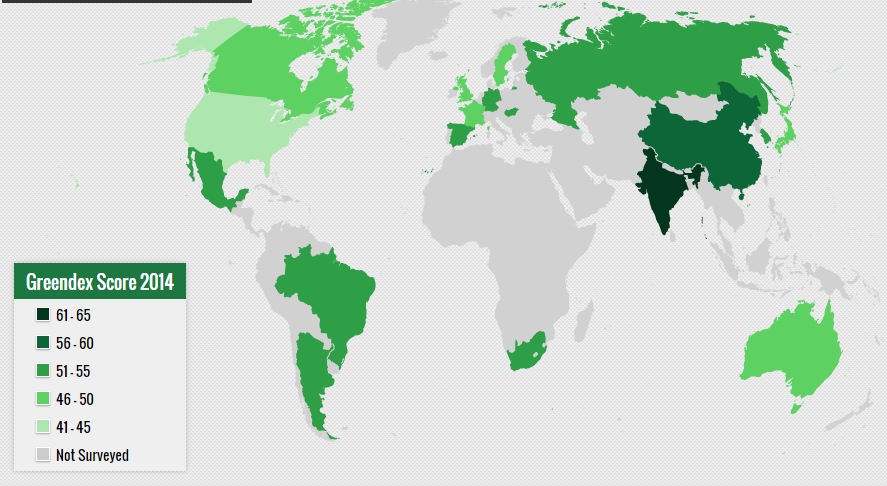Sustainable consumer behavior has only grown slowly: National Geographic’s Greendex.
Increased Fears About Environment, but Little Change in Consumer Behavior.

Everyone’s interested in being green. But do you really know how your personal choices are adding up? A new global analysis released by the National Geographic Society and GlobeScan finds that concern about environmental problems has increased in most countries surveyed, and that more people now expect global warming will negatively affect them during their lifetime than in 2012. Despite this, National Geographic’s Greendex, a comprehensive measure of consumer behavior in 65 areas related to housing, transportation, food and consumer goods, shows that sustainable consumer behavior has only grown slowly.
Results of the 2014 Greendex, a collaboration between National Geographic and global research consultancy GlobeScan, were released in Boston at the Sustainable Brands New Metrics ’14. Greendex 2014 surveyed 18,000 consumers in 18 countries and is the fifth iteration of the survey, which was first fielded in 2008.
“National Geographic developed the Greendex as an important tool for measuring sustainable behavior and changes in behavior around the world over time,” said Terry Garcia, chief science and exploration officer at the National Geographic Society. “The 2014 Greendex provides increased insight into what the drivers are for consumers to engage in more environmentally friendly behavior, such as peer influence and helping people see the connections between humans and the environment. This year we have seen that, although change is coming slowly, consumers are showing positive change in their attitudes about sustainable food choices; this data can help inform behavior change in other sectors.”
Eric Whan, who directs the Greendex project at GlobeScan, added, “It’s vital that all actors work together to enable substantive reductions in the environmental impact of consumer
behavior around the world. The research underlines that consumers need more encouragement from peers as well as enablement and better leadership from companies and governments to lighten their own impact. That’s why the Greendex is so important.”
Among the top findings in 2014:
- Environmental concern has increased since 2012: Sixty-one percent of consumers globally now say they are very concerned about environmental problems compared with 56 percent in 2012.
- Compared to the study’s 2008 baseline, sustainable consumer behavior has increased in nearly every country tracked since the first survey, suggesting consumer behavior across the world is improving, albeit slowly.
- Environmentally friendly behavior has increased in nine of the 17 countries that were surveyed in 2012: Argentina, Australia, Hungary, India, Mexico, Russia, Sweden, South Korea and Great Britain. However, sustainable behavior decreased since 2012 among consumers in five countries: Canada, China, Germany, Japan and the United States.
- Top-scoring consumers of the 2014 Greendex study are in the developing economies of India and China, followed by consumers in South Korea, Brazil and Argentina. Indian and Chinese consumers also scored highest in 2012.
- U.S. consumers’ behavior still ranks as the least sustainable of all countries surveyed since the inception of the Greendex study in 2008.
- More and more consumers are embracing local and organic foods and lightening their environmental footprint in the food category. Nearly all consumers believe that we need to change the way we produce and consume food in order to feed a growing population, and many say it is very important to know how and where their food is produced. Yet, relatively few people report that they do.
- Consumers are anxious about climate change: Fifty-one percent across the 18 countries surveyed in 2014 believe that global warming will negatively affect their own lives, up in seven surveyed countries from 2012 and down in none.
- Furthermore, 65 percent of consumers overall believe that most scientists are convinced that human activity causes climate change.


